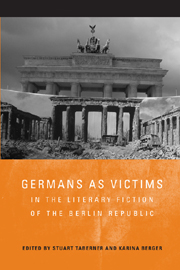Book contents
- Frontmatter
- Contents
- Acknowledgments
- Introduction
- 1 W. G. Sebald and German Wartime Suffering
- 2 The Natural History of Destruction: W. G. Sebald, Gert Ledig, and the Allied Bombings
- 3 Expulsion Novels of the 1950s: More than Meets the Eye?
- 4 “In this prison of the guard room”: Heinrich Böll's Briefe aus dem Krieg 1939–1945 in the Context of Contemporary Debates
- 5 Family, Heritage, and German Wartime Suffering in Hanns-Josef Ortheil, Stephan Wackwitz, Thomas Medicus, Dagmar Leupold, and Uwe Timm
- 6 Lost Heimat in Generational Novels by Reinhard Jirgl, Christoph Hein, and Angelika Overath
- 7 “A Different Family Story”: German Wartime Suffering in Women's Writing by Wibke Bruhns, Ute Scheub, and Christina von Braun
- 8 The Place of German Wartime Suffering in Hans-Ulrich Treichel's Family Texts
- 9 “Why only now?”: The Representation of German Wartime Suffering as a “Memory Taboo” in Günter Grass's Novella
- 10 Rereading Der Vorleser, Remembering the Perpetrator
- 11 Narrating German Suffering in the Shadow of Holocaust Victimology: W. G. Sebald, Contemporary Trauma Theory, and Dieter Forte's Air Raids Epic
- 12 Günter Grass's Account of German Wartime Suffering in Beim Häuten der Zwiebel: Mind in Mourning or Boy Adventurer?
- 13 Jackboots and Jeans: The Private and the Political in Uwe Timm's Am Beispiel meines Bruders
- 14 Memory-Work in Recent German Novels: What (if Any) Limits Remain on Empathy with the “German Experience” of the Second World War?
- 15 “Secondary Suffering” and Victimhood: The “Other” of German Identity in Bernhard Schlink's “Die Beschneidung” and Maxim Biller's “Harlem Holocaust”
- Works Cited
- Notes on the Contributors
- Index
3 - Expulsion Novels of the 1950s: More than Meets the Eye?
Published online by Cambridge University Press: 05 February 2013
- Frontmatter
- Contents
- Acknowledgments
- Introduction
- 1 W. G. Sebald and German Wartime Suffering
- 2 The Natural History of Destruction: W. G. Sebald, Gert Ledig, and the Allied Bombings
- 3 Expulsion Novels of the 1950s: More than Meets the Eye?
- 4 “In this prison of the guard room”: Heinrich Böll's Briefe aus dem Krieg 1939–1945 in the Context of Contemporary Debates
- 5 Family, Heritage, and German Wartime Suffering in Hanns-Josef Ortheil, Stephan Wackwitz, Thomas Medicus, Dagmar Leupold, and Uwe Timm
- 6 Lost Heimat in Generational Novels by Reinhard Jirgl, Christoph Hein, and Angelika Overath
- 7 “A Different Family Story”: German Wartime Suffering in Women's Writing by Wibke Bruhns, Ute Scheub, and Christina von Braun
- 8 The Place of German Wartime Suffering in Hans-Ulrich Treichel's Family Texts
- 9 “Why only now?”: The Representation of German Wartime Suffering as a “Memory Taboo” in Günter Grass's Novella
- 10 Rereading Der Vorleser, Remembering the Perpetrator
- 11 Narrating German Suffering in the Shadow of Holocaust Victimology: W. G. Sebald, Contemporary Trauma Theory, and Dieter Forte's Air Raids Epic
- 12 Günter Grass's Account of German Wartime Suffering in Beim Häuten der Zwiebel: Mind in Mourning or Boy Adventurer?
- 13 Jackboots and Jeans: The Private and the Political in Uwe Timm's Am Beispiel meines Bruders
- 14 Memory-Work in Recent German Novels: What (if Any) Limits Remain on Empathy with the “German Experience” of the Second World War?
- 15 “Secondary Suffering” and Victimhood: The “Other” of German Identity in Bernhard Schlink's “Die Beschneidung” and Maxim Biller's “Harlem Holocaust”
- Works Cited
- Notes on the Contributors
- Index
Summary
AT THE END OF THE 1950S, critic Karl Heinz Gehrmann spoke of the “unmanageable abundance” of literary works dealing with expulsion. Indeed, the decade produced a vast amount of texts — novels, diaries, and autobiographies — often written by expellees themselves to document or come to terms with their experience. Many of these stories retell the harrowing ordeal of being expelled, while others concentrate on the beauty and virtues of their lost Heimat. Tarnished perhaps by the sometimes aggressive calls by Vertriebenenverbände (expellee organizations) in the postwar years to reinstate the borders of 1937 and reclaim lost territories, expulsion texts from the 1950s have largely been viewed with suspicion. From the 1960s onward, expulsion literature has had to contend with the widespread assumption among critics and academics that it is revisionist or even revanchist, that it focuses exclusively on German suffering, and that it fails to engage with issues such as guilt and responsibility, and especially the victims of Nazism and the Holocaust. Thus, the Polish literary historian Ludmila Slugocka claimed in 1964 that these books were written “in the name of revanchism” and with a “readiness to fight for reaquisition,” while Germanist Jost Hermand, writing in 1979, criticized that, when reading these texts, one got the impression that Germans from the eastern provinces had been the primary victims of the Second World War, rather than Russians, Poles, or Jews. Indeed, Gertrud Fussenegger, one of the authors to be examined in this chapter, also noted that those thematizing expulsion in literature were generally regarded as “suspicious.”
- Type
- Chapter
- Information
- Publisher: Boydell & BrewerPrint publication year: 2009



